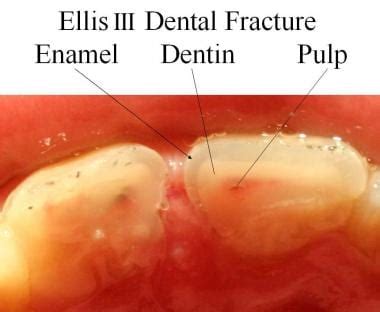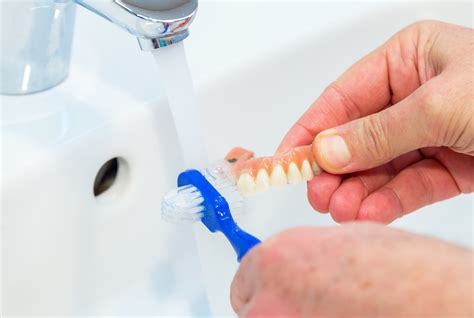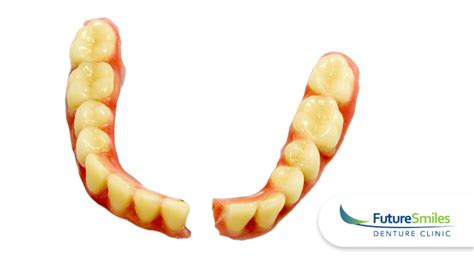Imagine a scenario where a vital component of your everyday life suddenly falters, impeding your ability to speak, eat, or even smile with confidence. A delicate yet essential fixture, dentures, play a significant role in enhancing the quality of life for individuals experiencing tooth loss. However, even the most meticulously crafted dentures can succumb to unexpected fractures, instigating a cascade of physical, emotional, and functional complications.
These unforeseen fractures not only compromise the aesthetic appeal of one's smile but also lead to a multitude of difficulties, hindering an individual's ability to chew food effectively and articulate words eloquently. The repercussions extend beyond the realm of physical inconvenience, as social and psychological ramifications arise, with newfound self-consciousness engulfing those who cherished the independence and confidence provided by their dentures. It is imperative to comprehend the gravity of denture breakage and explore avenues to effectively manage this overwhelming challenge.
Lamentably, there is no universal panacea for the fracture of dentures; however, comprehending the underlying causes and implementing preventive measures can alleviate the burdensome ordeal. A myriad of factors can contribute to the demise of dentures, ranging from improper handling, inadequate maintenance, to the natural wear and tear that accompanies their lifespan. A momentary lapse in attention or a mere accidental drop can irrevocably shatter the delicate framework, leaving individuals grappling with the consequences.
Overview of Denture Fractures: Understanding the Issue

When it comes to dental prosthetics, unfortunate incidents can occur that can significantly impact a person's oral health and well-being. One such challenge is denture fractures, the consequences of which can be both physically and emotionally distressing. This section aims to provide an overview of denture fractures, highlighting the importance of understanding this problem and its implications.
The Nature of Denture Fractures:
Fractures in dental prosthetics refer to the occurrence of cracks or breaks in the structure of a denture. These fractures can affect various components of the denture, including the base, teeth, or both. They can range in severity, from minor fissures that may only necessitate minor repairs to significant fractures that may require complete replacement of the denture. Denture fractures can result from a variety of factors, such as accidents, biting on hard objects, poor maintenance, or underlying issues with the denture's design or material.
The Impact of Denture Fractures:
The consequences of denture fractures extend beyond just the physical discomfort they cause. An individual who relies on dentures may experience difficulties in eating, speaking, and socializing due to compromised prosthetics. Moreover, the emotional toll cannot be ignored as the appearance and function of dentures are closely tied to a person's self-esteem and confidence. Consequently, denture fractures can have a significant negative impact on a person's overall quality of life.
Coping Strategies and Solutions:
Dealing with denture fractures requires a multi-faceted approach. From preventive measures to prompt repair strategies, it is crucial to understand and implement coping strategies to mitigate the impact of these fractures. Regular dental check-ups, proper denture care and maintenance, and seeking professional assistance for repairs are some of the essential steps in managing denture fractures. Additionally, exploring alternative options such as implant-supported dentures or considering newer denture materials can help minimize the risk of fractures and improve the longevity of prosthetic appliances.
In conclusion, denture fractures pose a significant challenge for individuals relying on dental prosthetics. Understanding the nature and implications of denture fractures is crucial for both patients and healthcare professionals. By employing appropriate coping strategies and seeking timely interventions, the impact of denture fractures can be minimized, allowing individuals to regain their oral functionality and maintain their quality of life.
Understanding the causes and consequences
Exploring the origins and effects
- Insights into what leads to denture damage
- Uncovering the potential ramifications
- An examination of the factors behind the issue
- An in-depth look into the repercussions
- The correlation between causes and outcomes
- Understanding the link between triggers and consequences
Within this section, we aim to delve into the various facets surrounding denture breakage, going beyond the surface to understand the underlying reasons and the subsequent impact this has on individuals. By unraveling the causes, we can identify preventive measures and take proactive steps to mitigate potential damage. Simultaneously, gaining insight into the consequences allows for a more comprehensive understanding of the physical, emotional, and practical challenges that arise from this ordeal.
- We will explore the factors contributing to denture breakage, ranging from material composition to poor maintenance habits.
- The potential consequences of denture damage will be examined, including the impact on oral health, speech, and overall well-being.
- An analysis of the connection between the identified causes and their corresponding consequences will provide a clearer picture of the significance of early intervention and proper denture care.
- By understanding the relationship between the causes and consequences, strategies can be devised to minimize the likelihood of breakage and improve the overall longevity of dentures.
Through a comprehensive exploration of the causes and consequences of denture breakage, we hope to shed light on this often overlooked aspect of dental health and arm individuals with the knowledge necessary to maintain optimal denture functionality.
The Importance of Proper Denture Care

When it comes to ensuring the longevity and effectiveness of your artificial teeth, nothing is more crucial than maintaining proper denture care. Implementing an appropriate routine not only enhances their functionality but also helps prevent potential damage or discomfort, allowing you to confidently go about your daily life.
A comprehensive denture care regimen involves various practices that are both simple and essential. From regular cleaning and soaking to regular dental check-ups, each step plays a vital role in preserving the quality and durability of your dentures. By committing to these practices, you can improve your oral hygiene, prevent plaque and bacteria build-up, and maintain the natural appearance and fit of your dentures.
One of the primary aspects of proper denture care is regular cleaning. Thoroughly cleaning your dentures daily removes food debris, plaque, and stains, preventing the development of odor and potential oral health issues. Using a soft-bristled toothbrush or a denture-specific brush along with a mild cleanser or denture paste helps maintain their cleanliness and overall hygiene.
In addition to cleaning, overnight soaking is crucial to keep your dentures in optimal condition. Using a denture cleaning solution or a mixture of water and vinegar or baking soda can help eliminate bacteria and dissolve stubborn stains. Soaking your dentures overnight also ensures that they retain their shape, preventing warping or adjustments in the long run.
Moreover, regular dental check-ups are vital for proper denture care. Your dentist can conduct thorough examinations, identify any signs of wear or damage, and make necessary adjustments or repairs to maintain the perfect fit. These routine visits also allow your dentist to assess your overall oral health and address any concerns or complications that may arise.
In conclusion, the importance of proper denture care cannot be understated. By adopting a consistent and comprehensive approach to caring for your dentures, you can extend their lifespan, preserve their quality, and enjoy a comfortable and confident smile. Remember, preventative measures and routine maintenance are key to ensuring the longevity and effectiveness of your dentures.
Tips and techniques for preventing damage
It is important to take proactive measures to safeguard your dentures and avoid potential harm. By following these tips and techniques, you can significantly reduce the risk of breakage and prolong the lifespan of your dental appliance.
Ensure proper cleaning: Regularly clean your dentures using a non-abrasive denture cleaner and a soft-bristled brush. Avoid using harsh substances or abrasive tools as they can weaken the denture structure.
Handle with care: Always handle your dentures with gentle hands. Be mindful of dropping them or applying excessive force, as this can lead to fractures or breakage. Utilize a soft towel or basin with water to serve as a cushion while cleaning or handling your dentures.
Avoid hot temperatures: Exposing your dentures to hot liquids or extreme temperatures can cause warping or distortion. It is advisable to rinse dentures with lukewarm water and refrain from placing them in hot water or microwaving them for cleaning purposes.
Protect during storage: When not wearing your dentures, store them in a designated denture case or container. Avoid placing them on hard surfaces or near the edge of countertops, as accidental falls may result in damage.
Regular dental check-ups: Schedule routine check-ups with your dentist to ensure proper fit and alignment of your dentures. Any signs of damage or wearing down can be addressed promptly to prevent further complications.
Be cautious while eating: Avoid biting down on hard or sticky foods that may put excessive pressure on your dentures. Cut food into smaller, manageable pieces and distribute chewing evenly to minimize the risk of breakage.
Consider denture adhesive: If you have a history of denture breakage, consult your dentist about the possibility of using denture adhesive. This can enhance the stability and retention of your dentures, reducing the likelihood of accidental damage.
By implementing these tips and techniques, you can proactively protect your dentures and minimize the chances of breakage, allowing you to maintain optimal oral health and functionality.
Common Indications of Denture Damage

Dentures, like any other dental appliance, can experience various types of damage over time. It is important to be aware of the common signs that may indicate denture damage in order to address the issue promptly and ensure optimal oral health and functionality.
1. Fractures: Cracks or fractures in the denture material can occur due to accidental drops or excessive pressure while biting or chewing. These fractures can lead to discomfort, changes in the fit, and difficulties in eating or speaking.
2. Wear and Tear: Over time, dentures may show signs of wear and tear due to regular use. This can manifest as worn-down teeth, thinning of the denture base, or loss of the natural shine of the material. These changes may affect the denture's ability to function properly and may require repair or replacement.
3. Discoloration: Dentures can gradually become stained or discolored, mainly as a result of consuming certain foods, beverages, or tobacco products. Discoloration can be unsightly and may also indicate the accumulation of bacteria or oral hygiene issues.
4. Loose Fit: If dentures no longer fit snugly or feel loose in the mouth, it could be a sign of damage or changes in the underlying bone structure. A loose fit can lead to discomfort, difficulty in speaking or eating, and may require adjustments or replacement of the dentures.
5. Irritation or Sores: Dentures that are damaged or ill-fitting can cause irritation or sore spots on the gums, tongue, or other oral tissues. These sores can be painful and may increase the risk of infection if not addressed promptly.
Recognizing these common indications of denture damage allows individuals to seek appropriate dental care and prevent further complications. Regular dental check-ups and maintenance are essential to ensure the longevity and effectiveness of dentures.
Recognizing the signs for immediate attention
In this section, we will explore the indicators that should not be ignored when it comes to denture breakage. It is crucial to be vigilant and recognize the warning signs to ensure timely care and prevent potential discomfort or complications. By understanding these red flags, individuals can take proactive measures to address the issue before it worsens.
1. Unusual clicking or clacking sounds: If you notice any unusual sounds coming from your dentures, it could be an indication of a potential breakage. These sounds can be caused by improper fit, loose components, or fractures in the denture structure. Pay close attention to any new noises and seek professional help to diagnose and resolve the issue.
2. Changes in the fit and comfort: Dentures that suddenly feel loose, uncomfortable, or have difficulty staying in place may signal a breakage. Such changes can result from damage to the denture base or its supporting components. It is essential to address these discomforts promptly to prevent further damage or oral health issues.
3. Visible cracks, chips, or missing pieces: Inspect your dentures regularly for any visible signs of damage. Cracks, chips, or missing pieces can compromise the integrity and functionality of the denture. These damages may not only affect the aesthetics but also cause discomfort or difficulty while chewing. If you notice any such issues, it is crucial to seek professional assistance for repair or replacement.
4. Gum irritation or soreness: Denture breakage can lead to ill-fitting or misaligned dentures, resulting in gum irritation or soreness. Persistent discomfort in the gum area can indicate a need for adjustment or repair of the dentures to ensure a proper fit. Ignoring these symptoms may lead to further complications, such as infections or tissue damage.
5. Difficulty speaking or chewing: A sudden difficulty in speaking clearly or problems with chewing certain foods may indicate denture breakage. When the dentures are damaged or improperly aligned, they can interfere with the natural movement of the tongue and jaw, affecting speech and chewing functionality. It is important not to overlook such challenges and seek professional assistance to restore proper denture function.
Note: It is crucial to remember that these red flags serve as general guidelines and are not a substitute for professional dental advice. If you experience any concerns related to denture breakage, it is recommended to consult with a dentist or a prosthodontist.
Repair or Replace: Making an Informed Decision

Exploring the Options: Evaluating the best course of action for broken dental appliances
When faced with the unfortunate incident of denture damage, it becomes crucial to assess the extent of the issue and determine whether repair or replacement is the most suitable solution. Making an informed decision requires understanding the consequences and benefits associated with either option. |
FAQ
What is denture breakage and why does it happen?
Denture breakage refers to the situation where a denture, a removable replacement for missing teeth, gets damaged or fractured. It can happen due to various reasons such as accidental dropping, improper care, natural wear and tear, or bite force exerted on the denture.
How can I prevent denture breakage?
To prevent denture breakage, it is essential to handle them with care. Avoid dropping them or exerting excessive force while cleaning. It is recommended to clean dentures over a folded towel or a basin of water to minimize the chance of breakage if dropped. Additionally, regular dental check-ups should be scheduled to ensure proper fit and function of the dentures.
What should I do if my denture breaks?
If your denture breaks, it is important to contact your dentist immediately. Avoid attempting to fix it yourself as it may lead to further damage. The dentist will assess the extent of the breakage and determine the best course of action, which may involve repair or replacement of the denture.
Can I still wear my denture if it has a small crack?
If your denture has a small crack, it is not recommended to continue wearing it. A crack can worsen over time and lead to complete breakage. It is crucial to consult your dentist for proper evaluation and repair. Wearing a cracked denture may cause discomfort, irritate the gums, or result in further damage to the denture or oral tissues.



